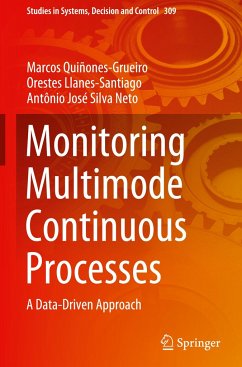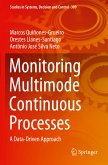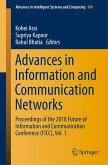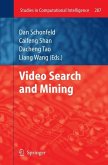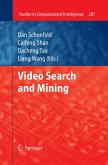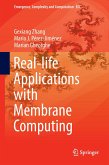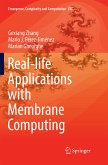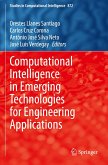Marcos Quiñones-Grueiro, Orestes Llanes-Santiago, Antônio José Silva Neto
Monitoring Multimode Continuous Processes
A Data-Driven Approach
Marcos Quiñones-Grueiro, Orestes Llanes-Santiago, Antônio José Silva Neto
Monitoring Multimode Continuous Processes
A Data-Driven Approach
- Gebundenes Buch
- Merkliste
- Auf die Merkliste
- Bewerten Bewerten
- Teilen
- Produkt teilen
- Produkterinnerung
- Produkterinnerung
This book examines recent methods for data-driven fault diagnosis of multimode continuous processes. It formalizes, generalizes, and systematically presents the main concepts, and approaches required to design fault diagnosis methods for multimode continuous processes. The book provides both theoretical and practical tools to help readers address the fault diagnosis problem by drawing data-driven methods from at least three different areas: statistics, unsupervised, and supervised learning.
Andere Kunden interessierten sich auch für
![Monitoring Multimode Continuous Processes Monitoring Multimode Continuous Processes]() Marcos Quiñones-GrueiroMonitoring Multimode Continuous Processes81,99 €
Marcos Quiñones-GrueiroMonitoring Multimode Continuous Processes81,99 €![Advances in Information and Communication Networks Advances in Information and Communication Networks]() Advances in Information and Communication Networks122,99 €
Advances in Information and Communication Networks122,99 €![Video Search and Mining Video Search and Mining]() Video Search and Mining121,99 €
Video Search and Mining121,99 €![Video Search and Mining Video Search and Mining]() Video Search and Mining116,99 €
Video Search and Mining116,99 €![Real-life Applications with Membrane Computing Real-life Applications with Membrane Computing]() Gexiang ZhangReal-life Applications with Membrane Computing81,99 €
Gexiang ZhangReal-life Applications with Membrane Computing81,99 €![Real-life Applications with Membrane Computing Real-life Applications with Membrane Computing]() Gexiang ZhangReal-life Applications with Membrane Computing81,99 €
Gexiang ZhangReal-life Applications with Membrane Computing81,99 €![Computational Intelligence in Emerging Technologies for Engineering Applications Computational Intelligence in Emerging Technologies for Engineering Applications]() Computational Intelligence in Emerging Technologies for Engineering Applications81,99 €
Computational Intelligence in Emerging Technologies for Engineering Applications81,99 €-
-
-
This book examines recent methods for data-driven fault diagnosis of multimode continuous processes. It formalizes, generalizes, and systematically presents the main concepts, and approaches required to design fault diagnosis methods for multimode continuous processes. The book provides both theoretical and practical tools to help readers address the fault diagnosis problem by drawing data-driven methods from at least three different areas: statistics, unsupervised, and supervised learning.
Produktdetails
- Produktdetails
- Studies in Systems, Decision and Control 309
- Verlag: Springer / Springer International Publishing / Springer, Berlin
- Artikelnr. des Verlages: 978-3-030-54737-0
- 1st edition 2021
- Seitenzahl: 176
- Erscheinungstermin: 5. August 2020
- Englisch
- Abmessung: 241mm x 160mm x 16mm
- Gewicht: 436g
- ISBN-13: 9783030547370
- ISBN-10: 303054737X
- Artikelnr.: 59647995
- Herstellerkennzeichnung Die Herstellerinformationen sind derzeit nicht verfügbar.
- Studies in Systems, Decision and Control 309
- Verlag: Springer / Springer International Publishing / Springer, Berlin
- Artikelnr. des Verlages: 978-3-030-54737-0
- 1st edition 2021
- Seitenzahl: 176
- Erscheinungstermin: 5. August 2020
- Englisch
- Abmessung: 241mm x 160mm x 16mm
- Gewicht: 436g
- ISBN-13: 9783030547370
- ISBN-10: 303054737X
- Artikelnr.: 59647995
- Herstellerkennzeichnung Die Herstellerinformationen sind derzeit nicht verfügbar.
Marcos Quiñones Grueiro is graduated Summa Cum Laude of Automation in 2012 (Universidad Tecnológica de la Habana "José Antonio Echeverría"). He obtained the M.S. degree in Industrial Informatics and Automation, and in 2017 the Ph.D. degree in Technical Sciences with specialization in Automation. Since 2012 he is a Professor at the Automation and Computing Department, Universidad Tecnológica de La Habana José Antonio Echeverría, CUJAE, Cuba. He won the Excellence Scholarship from Mexican Government for Foreign Students in 2016, and made a one-year exchange program in Mexico (Universidad Nacional Autónoma de Mexico, UNAM) from 2016 to 2017. He authored 10 journal papers, 3 book chapters, and 15 full conference papers. His research interest areas are process safety, fault detection and diagnosis of industrial processes, leak detection and location in water distribution networks, and reinforcement learning with applications to control. OrestesLlanes Santiago obtained the Degree of Electrical Engineer from Instituto Superior Politécnico José A. Echeverría, CUJAE, in La Habana-Cuba in 1981. He pursued graduate studies from 1989 to 1994 at the Universidad de Los Andes, Mérida-Venezuela, where he obtained the degree of Master of Science in Control Engineering in 1990, and the degree of Doctor in Applied Sciences in 1994. He is currently a Full Professor and Researcher in the Automation and Computing Department of CUJAE, where he has also held the positions of Head of the Automation and Computing Department from 1996 to 2002, Dean of the Electrical Engineering Faculty from 2002 to 2007, Director of Postgraduates Studies in 2008, and Vice Rector of Research and Postgraduate Studies from 2009 to 2015. Also, he is currently the Coordinator of the Master Program in Mathematical Modeling applied to Engineering, Coordinator of the Doctoral Program in Automation, and the Head of the Research Laboratory in Parameter Estimation and Fault Diagnosis in Industrial Systems. He was the General Coordinator of the National Member Organization of Cuba in IFAC (Red de Automática de Cuba) since 1998 to 2016. Furthermore, he is a Titular Member of the Sciences Academy of Cuba since 2012, and currently Vice-Coordinator of the Technical Sciences Section of this Institution. He has authored, or coauthored, 163 full conference papers, 114 full technical papers, 27 book chapters and 3 books (2 as editor/organizer). His areas of interest are fault diagnosis in industrial systems, nonlinear control, inverse problems, and computational intelligence with applications to control. Antônio José da Silva Neto is a Mechanical / Nuclear Engineer (Universidade Federal do Rio de Janeiro - UFRJ, Brazil, 1983), M.Sc. in Nuclear Engineering (UFRJ, 1989), and Ph.D. in Mechanical Engineering, with a minor in Computational Mathematics (North Carolina State University, USA, 1993). He worked as engineer/researcher for the Brazilian National Nuclear Energy Comission - CNEN (1984-1986), and as consultant/engineer for Promon Engineering (1986-1997). In 1997 he joined the faculty of Universidade do Estado do Rio de Janeiro - UERJ, being since 2013 a Full Professor at the Polytechnic Institute. He has held different positions in scientific evaluation and administration institutions: President (2014-2017) of the Brazilian Society of Computational and Applied Mathematics - SBMAC; President (2009-2013) of the Brazilian Association of Mechanical Sciences and Engineering - ABCM; Member (2014-2016) of the Deliberative Council of the Brazilian Council for Scientific and Technological Development - CNPq; Coordination Member (2008-2016) of the Interdisciplinary Area of the Coordination for the Improvement of Higher Education Personnel - CAPES; Municipal Secretary of Science and Technology (2010-2011) in Nova Friburgo, Rio de Janeiro; and Area Coordinator in Mechanical and Nuclear Engineering (2012 -2018) of the Carlos Chagas Filho Foundation for Research Support in the State of Rio de Janeiro (FAPERJ). He has also been the Coordinator of Projects and Technological Development (1997-2008), and the Coordinator of the Graduate Program in Computational Modelling (2005-2007) of the Polytechnic Institute (UERJ). He is the Head of the Patrícia Oliva Soares Laboratory for Experimentation and Numerical Simulation in Heat and Mass Transfer (LEMA), and of the Paulo Márcio de Mello Laboratory for Metrology and Mechanical Testing (LEMec). Since 2017 he is a Titular Member of the Brazilian National Academy of Engineering. He has published 14 books (six as editor/organizer), 61 book chapters, 143 full journal papers, and 416 full conference papers. He has supervised 20 visiting and postdoctoral fellows, and 28 doctoral and 48 masters students. His areas of interest are Mechanical Engineering, with emphasis in heat and mass transfer, and environmental modelling, and Applied and Computational Mathematics, with emphasis in numerical methods, computational intelligence and inverse problems.
Data-driven Fault Diagnosis.- Multimode Continuous Processes.- Multimode Continuous Processes Clustering.- Multimode Continuous Processes Monitoring.
Data-driven Fault Diagnosis.- Multimode Continuous Processes.- Multimode Continuous Processes Clustering.- Multimode Continuous Processes Monitoring.

